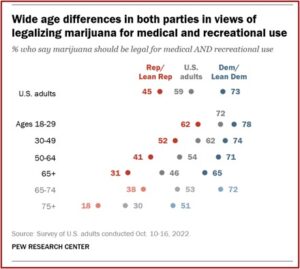
President Biden pardoned individuals convicted of marijuana possession under federal law and said marijuana’s classification as a Schedule I Controlled Substance—as is heroin—would be reviewed. The NYT reported the pardons will clear everyone convicted on federal charges of simple possession since it became illegal fifty years ago. They will not apply to individuals convicted of selling or distributing marijuana. Soon afterwards, the Pew Research Center conducted a survey in October of 2022 on whether or not marijuana should be legal for medical or recreational use. Not surprisingly, 59% of Americans thought it should be legal for medical and recreational use and 30% said it should only be legal for medical use.
The Pew article also noted two additional states legalized the use of marijuana for recreational use, bringing the total number of states to 21 which have already done so. There are clear differences demographically by age and party affiliation. Seventy-two percent of adults aged 18-29 favored legalizing medical and recreational marijuana, while only 46% of adults 65 and over did. Seventy-three percent of those who said they were Democrats or Democratic-leaning independents favored legalizing medical and recreational marijuana use, while only 45% of Republicans and Republican-leaning independents. See the following graph taken from the Pew article.
In Pennsylvania, the Democratic support to legalize recreational marijuana received a boost at the midterms, even though it was not one of the two states to legalize it. John Fetterman, who just won the Senate race of 2022, has been vocal about his support for legalization from the beginning of his tenure as Lieutenant Governor of Pennsylvania in 2019. He said on his web page, “Weed should be legal, nationwide.” He thought we needed to “move our views on this subject out of the Stone Age.” See “Should Pennsylvania Go ‘Full Colorado’ with Marijuana? Part 1.”
Rescheduling and decriminalizing marijuana are two reform measures that do not require Pennsylvania to also go “full Colorado” with legalizing recreational marijuana. Pennsylvanians should know that Colorado has had problems after legalization and passed state bill H 1317, which applied to the state’s marijuana industry. Note the measure passed with strong bipartisan support. Purchases of high-potency marijuana were limited to one-fifth the original level. “The bill requires warning labels, real-time monitoring of sales, and stiffened medical recommendations from physicians.” It also called for research into the mental and physical health effects of marijuana.
Supporters of legalization in Colorado said creating a regulated market would drive out the “criminal element” and end the violence driving the black market, but the opposite has happened. The Black market still dominates the marijuana business, “as has happened everywhere state have legalized marijuana, from California to Illinois.” It was supposed to end corruption, but actually spread it more widely. “Not only did the promised benefits, both financial and on behalf of public safety, not come to pass, but in multiples areas of daily life the metrics have worsened.”
Colorado traffic deaths have increased 24% overall. Deaths in which drivers tested positive for marijuana increased 135%. “The percentage of all Colorado traffic deaths that were marijuana related has risen from 15 percent in 2014 to 25 percent in 2019.” More marijuana calls are coming into poison centers. Adverse marijuana-only exposures have quadrupled since legalization. Emergency-department events and marijuana-related hospitalizations increased sharply.
As the years since legalization have passed, the public health and public safety impact has grown, year over year. The effect on families, on pediatricians, on educators, on emergency departments, on the workplace, on law enforcement, and indeed on the general quality of life in a once thriving state, has been strikingly negative.
We should not be surprised to learn that there is a high cost to making an addictive and dangerous substance a commercial product. Nor should we enable this public policy mistake to take root elsewhere. Taking stock, we can now say that the so-called legalization experiment has, at least, produced one positive impact—it has issued a clear warning about the path we are on.
Then there was the publication of a study published on November 15, 2022 in the journal Radiology that found airway inflammation and emphysema were more common in people who smoked marijuana and cigarette smokers and nonsmokers, “Chest CT Findings in Marijuana Smokers.” The lead author of the study was quoted in Medical News Today as saying, “93% of the marijuana smokers had emphysema rather than 67% of the tobacco-only smokers.” The researchers also found cannabis smokers had higher rates of airway inflammation. The CT imaging showed greater mucus buildup in the airways, thickening of the bronchial wall, and sometimes irreversible enlargement of the airways, all of which can lead to more congestive symptoms and infections.
While the public impression is that cannabis is relatively safe and may be safer than cigarettes, “the newly identified link between cannabis use and irreversible lung damage could mean that cannabis is potentially more harmful than many people may realize.” A possible explanation between marijuana and irreversible lung damage could be because marijuana is usually smoked unfiltered, where tobacco cigarettes are generally filtered. When marijuana is inhaled, more particulates are deposited in the airways, likely acting as irritants. Compared to tobacco, the way marijuana is inhaled (a longer time and a higher volume when holding your breath) may lead to microtrauma with the airspaces causing emphysema.
The researchers said the small sample size of their study (56 marijuana smokers, 57 nonsmoker controls, 33 tobacco-only smokers) precluded them from drawing strong conclusions from their findings. Nevertheless, the research may have implications for patients who smoke marijuana for pain relief and other reasons. A critical care medicine specialist and pulmonologist who was not involved in the study told Medical News Today:
The findings of the research point towards confirming a trend we have observed with younger patients presenting with more breathing difficulties. Any inhalation of particulate matter, whether tobacco smoke or marijuana, causes inflammation within the airways.
President Biden’s actions with marijuana are constructive and will allow solid scientific research into the adverse effects and the medical benefits of marijuana to move forward. Hopefully, the piece-meal, state-by-state backdoor way of legalizing recreational marijuana will slow down. Pennsylvania needs to wait and see what that research will show before it goes “full Colorado.” And it seems the evidence will be a mixed bag.






